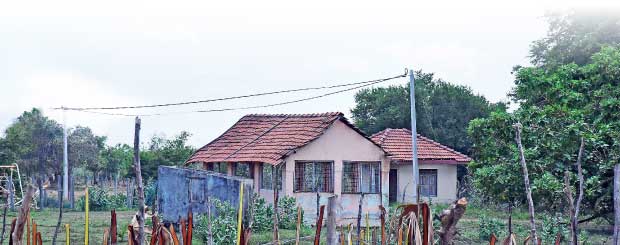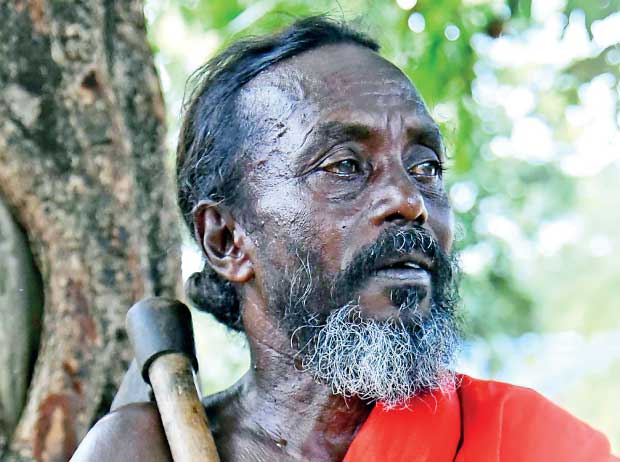Reply To:
Name - Reply Comment
Last Updated : 2024-04-24 06:20:00

A tale about a vanishing fisher community as told by its leader Ambalawarige Velayudham
 Veddas, said to be descendants of King Vijaya, are known to be the earliest inhabitants of this land. Referring to themselves as forest-dwellers, the Vedda communities are shrouded in secrecy, mythology and mystery than any other group of people in the country. As of late, we have only been referring to one clan – the UruwarigeVeddas of Dambana. But there are several others who have settled down in other parts of the island. While each clan has different livelihoods and hunting practices, they also have different ceremonies unique to them.
Veddas, said to be descendants of King Vijaya, are known to be the earliest inhabitants of this land. Referring to themselves as forest-dwellers, the Vedda communities are shrouded in secrecy, mythology and mystery than any other group of people in the country. As of late, we have only been referring to one clan – the UruwarigeVeddas of Dambana. But there are several others who have settled down in other parts of the island. While each clan has different livelihoods and hunting practices, they also have different ceremonies unique to them.
Amongst these clans, the Vedda community of the Ambalawarige clan has its settlements in Vakarai. Also referred to as the Coastal Veddas of Sri Lanka, they speak mainly in Tamil and do fishing as their main occupation. But as of now, their traditions are dying and their culture has been subject to extinction. While on a recent visit to Vakarai, the Daily Mirror sat down to have a chat with AmbalawarigeVelayudham, the Vedda Leader of Vakarai.
Firstly the Government has to give us prominence since we are the earliest inhabitants of this land. During the previous regime, we were asked to visit Temple Trees and we got an opportunity to voice our issues. But to date, the present Government hasn’t inquired about our well-being
Following are excerpts of the interview.
Q Tell us about your settlements in the East Coast.
Our ancestors have always told us about a Vedda settlement in Mahiyangana, but we didn’t see them till recently. My father and grandfather claimed to be descendants of the Veddas and engaged in various activities from fishing to hunting, agriculture and paddy cultivation as the main sources of sustaining their families. So in 1966 they settled down in Vakarai and in other places along the East Coast. Since then we have been peacefully living here except for the days during the ethnic conflict. During that period we resided at a temporary shelter given by an NGO. But now we live in peace.
Q Where are the other settlements in the East Coast?
There are Vedda settlements in Verugal, Kayungkerny, Talaway, Modera, Kaduwalay, Nakareni and various other places.
Q How does the Ambalawarige clan which you belong to, differ from the rest?
We have different ways of sustaining our families and aren’t very much involved in hunting like the Uruwarige clan. We are mainly involved in fishing and cultivation. Hunting has been made difficult by the authorities themselves and it’s difficult to find food the way we used to. You may have seen that my wife and daughters wear dresses when ideally they should be wearing ‘redda and hattai.’ This is mainly due to commercialization. We have various other clans including Morana, Namudan, Tala, Rugam and many more.

Q What are the special ceremonies that are unique to your clan?
Many of us follow Saivite Hinduism and therefore worship God Shiva. But we also worship other deities such as Murugan, Pillayar and Amman. We also worship two other deities known as ‘Kapalpei’ and ‘Kumara Deivam’. In order to worship them with respect and honour, we have a ceremony known as ‘Sadangu’ which is a devil-dancing ceremony. During this ceremony many local Tamil people experience being possessed by spirit, going into a state of trance and speaking a different dialect of Tamil altogether. Since we don’t very much understand it people believe that they are speaking something similar to the original Vedda language.
Hunting has been made difficult by the authorities themselves and it’s difficult to find food the way we used to. You may have seen that my wife and daughters wear dresses when ideally they should be wearing ‘redda and hattai.’ This is mainly due to commercialization.
Q As of today, with the rapid phase of modernisation, how challenging is it to engage in these traditions?
If you see my family members, they dress and look like normal Tamil people. Since we settled down in the coastal areas, we were influenced by modern practices. So, as I mentioned before, my wife and daughters wear dresses. Therefore, in terms of preserving our culture, we are facing a major risk. It has been difficult to identify how our customs and norms would be passed on to the next generation. Once I pass away, the tribe will be taken over by my brother. If he doesn’t take this forward our clan will be extinct. Another issue is that our children are reluctant to take these traditions forward. One problem is that they (Children) are both daughters, but they too have an important role to play. Unlike the Vedda womenfolk in the Dambana area, we have given them more freedom.
Q With deforestation and environmental pollution, what challenges have you faced in terms of hunting, fishing and other practices?
Water is one of the main scarcities here. This should have been a result of the on-going drought, but it has greatly affected us. We don’t have water to use for cultivation purposes and as a result there’s no way we could continue the crop cycles. The entire harvest has been affected. This is where the Government should look at us, but we have been classified as normal people and it’s difficult to maintain our identity. So if we also engage in commercial jobs, we wouldn’t have faced any of these challenges. With various chemicals being washed off to the lakes and the sea, there’s a dearth of fish that is considered suitable for consumption.
Q You mentioned about a risk in passing down tradition. Since you have a bigger role to play in this task, how will you take-up this responsibility?
I think the Government must look at our past. If you go to Dambana you could find a lot of information about us, but we don’t have a similar facility here. At least if a museum could be setup we could have explained about our traditions and lifestyles to visitors. In addition to that our children also could have referred to such a facility in time to come. We have failed to preserve the weapons and other materials we used back in the day and therefore we have nothing to prove as being unique to our clan. We mainly used the bow and arrow to hunt animals, but after bans were imposed we have stopped hunting practices too.
Q Do you think that the younger generation would continue with these practices given the rapid phase of modernisation?
That is something I fear as well. One problem is that they can’t understand or speak Sinhala. So in time to come it will be difficult for them to move around with the visitors who arrive. They go to school, but each one is considered as another Tamil student and not as a child coming from a Vedda family. Therefore they have naturally adjusted themselves to the modern setup. They definitely wont engage in farming or fishing activities and will look for Government jobs. So there itself they have moved largely away from tradition. Unless what we have now is conserved, they will never identify themselves with their Vedda background in time to come. This is why we fear losing our own identities as the earliest inhabitants in this land.
Q Language is another unique feature of the Vedda clan, but you speak only Tamil. What is the reason for this difference?
The Vedda language is only used to speak. It has never been documented. So, unless a child is exposed to it at an early age, one will never learn it as it needs more practice. But we have spoken Tamil throughout this period of time and as a result our children also speak Tamil. If we have to learn the Vedda language we have to visit the Uruwarige Leader in Dambana, but we don’t have the necessary funds to do so. It’s true that this language is unique to us, but it would be difficult to introduce it to this clan now.
Many of us follow Saivite Hinduism and therefore worship God Shiva. But we also worship other deities such as Murugan, Pillayar and Amman. We also worship two other deities known as ‘Kapalpei’ and ‘Kumara Deivam’
Q What immediate actions should the Government take in order to improve your livelihoods?
Firstly the Government has to give us prominence since we are the earliest inhabitants of this land. During the previous regime, we were asked to visit Temple Trees and we got an opportunity to voice our issues. But to date, the present Government hasn’t inquired about our well-being. I doubt if they even know that we exist. Therefore we would like to urge from the Government to either visit us or give us a chance to visit them and improve our livelihoods and help us preserve what we possess.
According to research done by anthropologists such as C. G. Seligman, the chief Vedda settlements north of Batticaloa are Pellanchenai near Kalkudah and at Varkanari, some 10 miles north of Kalkudah on the far side of the river which is crossed by a ferry at Valachchenai. At Panichchenkeni, some 14 miles further north is another ferry, where the local Veddas act as ferrymen. There are two other Vedda settlements some three miles beyond the ferry at sites called Vellaiade and Kandaladi respectively.
At present, most of what is remaining of this tribe of East Coast Veddas has mixed with various races and its members are living, especially with Tamils, in and around Batticaloa town. Some look very much like modern Tamils, attired in modern dresses and using Tamil as their mother tongue. The Vedda community is considered the lowest of the regional castes and its members are shunned by persons of higher castes in the region. As a result of denying themselves thus, the coastal Vedda clan has experienced a tremendous loss of heritage and roots.
The Coastal Veddas have become expert fishermen and make and use various forms of nets including a cast net. They also spear and shoot fish, using a bifid iron spear-head which they have adopted from the Tamils. To shoot fish they use the usual Vedda bow, but the arrow has become a harpoon with a shaft being as long as the bow and into which the iron with its running line fits loosely.

Add comment
Comments will be edited (grammar, spelling and slang) and authorized at the discretion of Daily Mirror online. The website also has the right not to publish selected comments.
Reply To:
Name - Reply Comment
US authorities are currently reviewing the manifest of every cargo aboard MV
On March 26, a couple arriving from Thailand was arrested with 88 live animal
According to villagers from Naula-Moragolla out of 105 families 80 can afford
Is the situation in Sri Lanka so grim that locals harbour hope that they coul